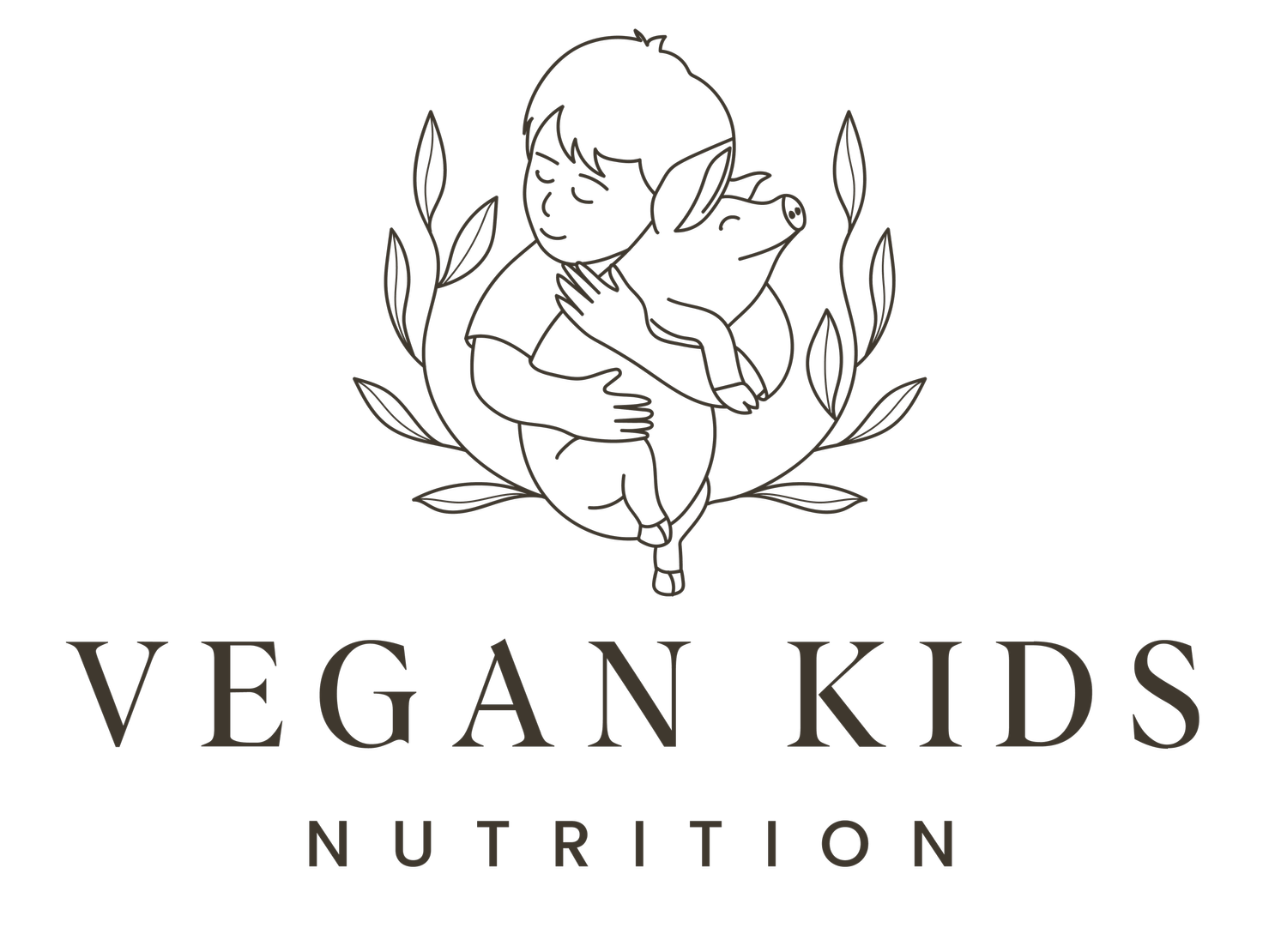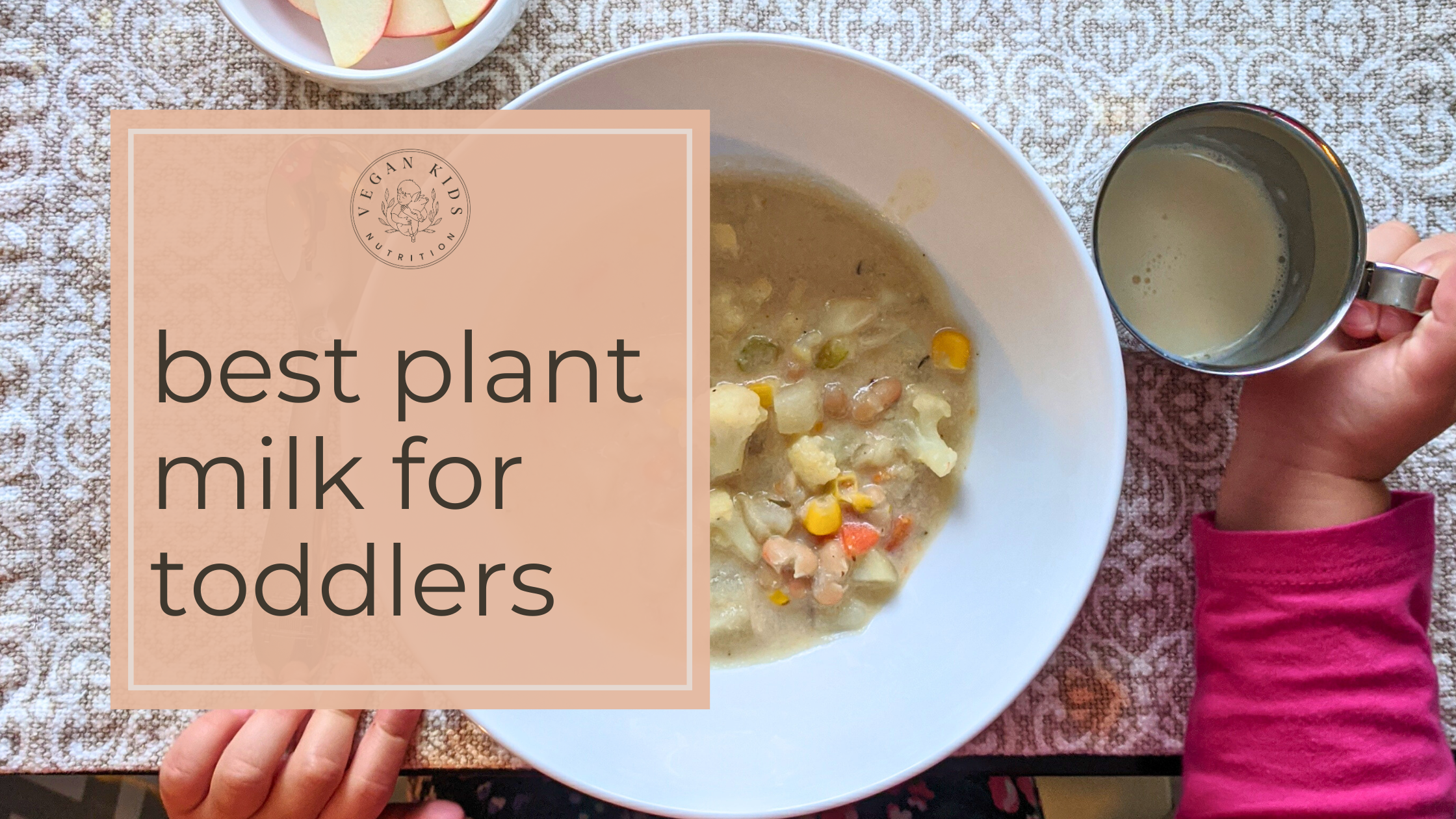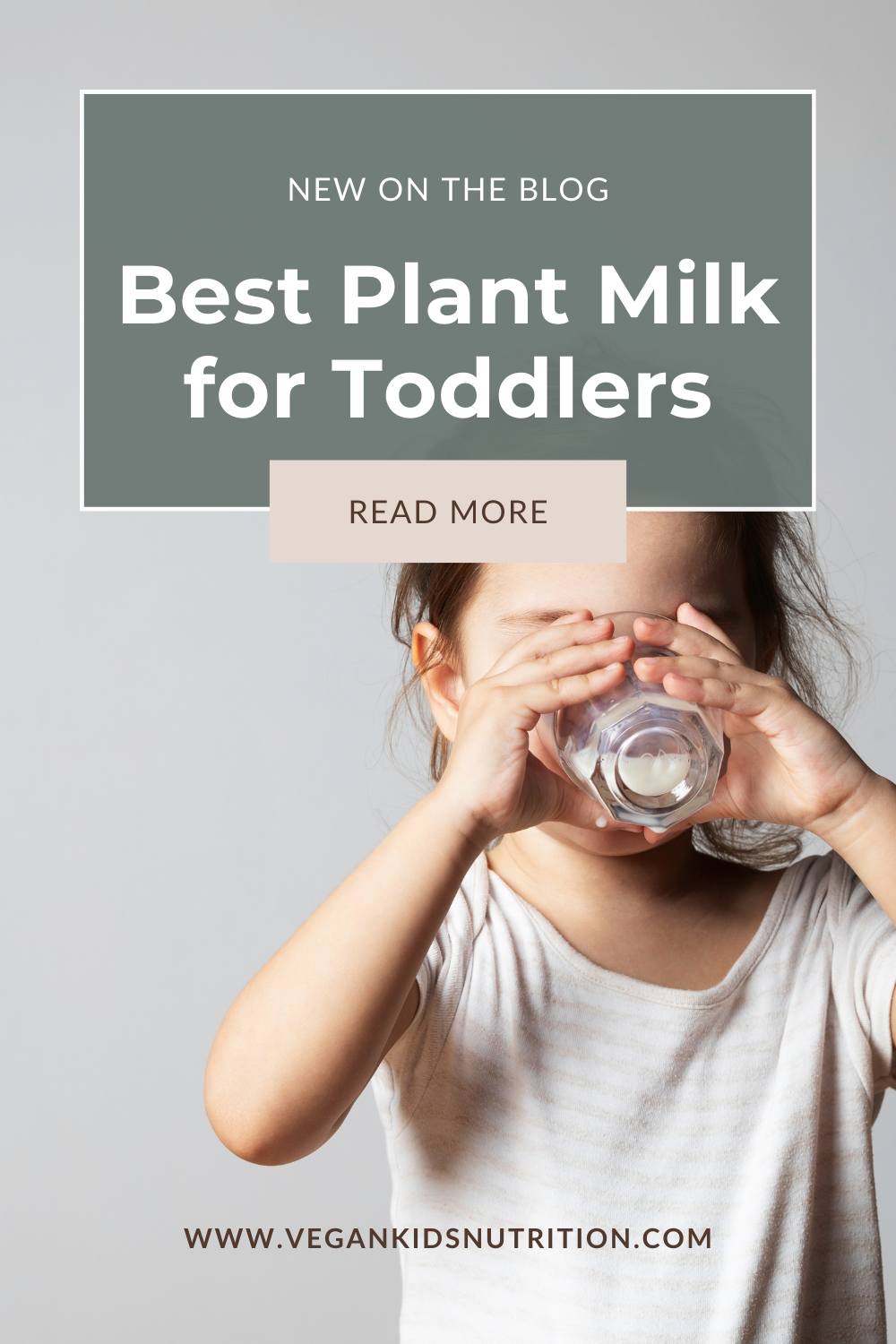With so many plant milks on the market, it can be overwhelming to know which one to choose. In this blog post, I share what the best plant milk is for your vegan toddler, compare the nutrition profile of other alternative milks, and answer whether a plantbased milk is good for toddlers.
Many parents have asked me what the best non-dairy milk is for their vegan toddler as they transition away from breastmilk and/or formula. With so much misinformation out there on plant milks, this is a very common concern for parents. Not all plant milks are created equal so I’ll be reviewing the nutrition profile of each and sharing which one is the most appropriate for growing, vegan children.
Breastmilk is the primary nutrition for infant
Let’s begin by talking about the primary source of nutrition for kids under 12 months of age. The American Academy of Pediatrics (AAP) recommends that infants be breastfed or provided infant formula until they reach the age of 1 year old. Plant milks should never replace breastmilk or soy-based formula for an infant as a beverage (but can be used in recipes like pancakes or chia pudding). This is because breastmilk and/or formula provide a large amount of an infant’s calories, fat, calcium and other key nutrients and plant milks simply do not meet these needs for an infant. The AAP also states that breastfeeding can continue well beyond the 1 year mark for as long as you and your baby desire. There’s really no rule or guideline of when to begin the weaning period, as long as it’s after your baby is 12 months of age.
Is plant-based milk good for toddlers?
You may have heard that cow’s milk is superior to a plant milk, leaving you question if your toddler can drink a plant milk to support their growth. Children don’t need cow’s milk to meet their nutritional needs. The nutrients provided by a nutritionally adequate plant milk is comparable to that of cow’s milk. So, yes, a plant milk is safe and appropriate for growing kids. The key here is to ensure they receive the most nutritionally adequate plant milk, which we’ll identify below.
What’s the best plant milk for toddlers?
Once your infant reaches their first birthday, you can certainly transition to a plant milk. Not all plant milks are created equal, which means they are not all suitable in meeting the nutritional needs of a growing toddler.
A plant milk should provide adequate calories, fat, carbohydrates, protein, and preferably be fortified with several key nutrients like Vitamin D, Vitamin B12, and Calcium. The only plant milk that meets this criteria is soy milk. Unsweetened, full fat, fortified soy milk is the recommended and best plant milk for children. While there isn’t any soy milk to my knowledge here in the USA that is labeled “light” or “low-fat”, if you happen to see one, it’s best not to choose lower-fat soy milk this will provide far less calories per serving for kids. Toddlers and children need adequate fat in their diet for proper growth and brain development.
When you look for a fortified soy milk, be sure that the Nutrition Facts Label and ingredients list reads Vitamin D, Vitamin B12, and Calcium. Majority of plantbased milks list Vitamin D2 which is appropriate and vegan. You’ll want to look for a plant milk that provides calcium carbonate as oppose to tri-calcium phosphate. While both are appropriate for meeting calcium needs, calcium carbonate has a higher elemental calcium, meaning it has a higher bioavailability and is absorbed at slightly higher rate than tri-calcium phosphate. This type of calcium must be taken with food for absorption, so be sure to provide soy milk to your toddler with a meal or snack. And don’t forget to always shake the plant milk container well before pouring as calcium tends to settle at the bottom and you want it to be well distributed.
Other plant milks like almond milk, rice milk, or coconut milk are not suitable to meet the nutritional needs of growing kids. They lack protein, carbohydrates, and fat which are crucial nutrients during early childhood.
Nutrition comparison of other plant milks (per 1 cup each)
Soy Milk
Calories: 80
Total Fat: 4gm
Carbohydrates: 3gm
Protein: 7gm
Almond Milk
Calories: 30
Total Fat: 2.5gm
Carbohydrates: 1gm
Protein: 1gm
Rice Milk
Calories: 70
Total Fat: 2.5gm
Carbohydrates: 11gm
Protein: 0gm
Coconut Milk
Calories: 45
Total Fat: 4.5gm
Carbohydrates: 1gm
Protein: 0gm
Flax Milk
Calories: 25
Total Fat: 2.5gm
Carbohydrates: 1gm
Protein: 0gm
Pea Milk
Calories: 70
Total Fat: 4.5gm
Carbohydrates: 0gm
Protein: 8gm
Is soy safe for children?
Many parents are concerned about providing soy products to their children of fear that it may cause cancer or feminization in boys; however, these claims are myths. Soy foods contain isoflavones, which are plant chemicals capable of having estrogen-like activity. For this reason, isoflavones are called phytoestrogens. However, people seem to couple the two and believe that they are the same; that isoflavones are estrogens. Phytoestrogens and estrogens are not the same, one is a plant compound and one is a hormone produced by the body. They do have similar structures but are different entities that behave differently in our body.
Soy foods are safe for children to consume and that includes soy milk. Studies show that introducing soy foods to children from an early age prevents the risk of developing certain types of cancers. Moderate intake of soy is considered safe and beneficial for overall health; thus, introducing soy milk to your toddler’s diet is perfectly okay to do. I recommend purchasing ‘organic’ and one with the seal of approval for ‘non-gmo’.
What’s the best soy milk for toddlers?
I generally recommend the 365 Organic Unsweetened Soy Milk from Whole Foods (in USA) due to overall nutrition as it’s fortified, contains the desired type of calcium, and overall tastes better (to me and my family) than others.
But there are other brands that can work for your family depending on taste, ingredient preference, and budget. EdenSoy Extra and Silk can be other soy milks that you can try. In the end, choose the one that’s a better fit for your family and one that your toddler will accept.
Are homemade plant milks okay for toddlers?
Homemade milks like almond or oat milk do not provide the same nutrition as a commercial plant beverage. They lack important nutrients that are part of fortification, such as Vitamin D, Vitamin B12, and Calcium. So, I don’t recommend homemade plant milk as the primary source of plant milk for toddlers and children. You may however incorporate them into their meals like oatmeal or a pancake recipe if you’d like.
Best milk alternative for kids with a soy allergy
If your child has a soy allergy or sensitivity, then it is best to consume a plant milk alternative to soy. I recommend a pea-based or full-fat oat milk. While each lack a few nutrients compared to soy, they are a much better alternative to soy and a much better option than other nut or coconut milks. As long as the diet is varied and well-balanced, these options would be adequate to meet your child’s nutrient requirements.
Sample a variety of brands until you find one that is suitable for your family and one that your toddler or child enjoys the taste. Finding the right non-dairy milk alternative is important to ensure healthy food habits in children.
FREE Guide
In this FREE Essential Starter Kit, you’ll learn the top 5 things to focus on to support your child’s growth on a vegan diet








